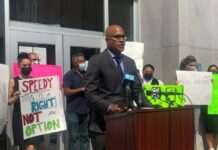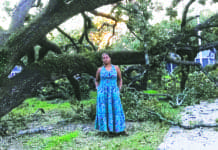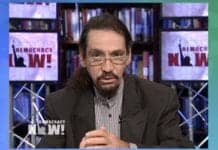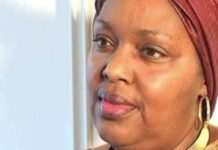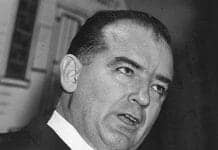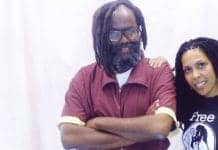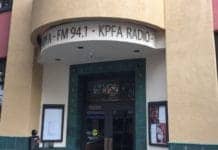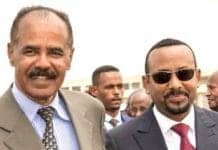by Ann Garrison

Also here, after the KPFA News, is my more in depth conversation with Milton, the recording that was too long for a KPFA newscast.
In a better KPFA world, both could be found by someone using a Web browser on the KPFA website’s page for that day’s Weekend News.
The news segment would be a discreet podcast with a discreet, sharable URL and a note pointing to the extended conversation, which would either be hot linked in or playable on the page, maybe even featured, with a picture or a map, on that day’s Weekend News page. It would be additional information that KPFA’s audience would discover after finding the page in Google Search or dropping in on the KPFA website.
The next week’s Weekend News page might feature an extended interview or “for more info” links on another story from another part of the world, including our immediate environs. But all news segments would be discreet podcasts with discreet URLs that could be found in a Web browser.
And the page would, of course, include a note: “We can’t keep producing KPFA News without your support, so please contribute or, better yet, subscribe, become a sustainer” and a button for doing so.
As it is now, KPFA’s segmented public affairs shows appear only as full length podcasts, an hour or half hour’s news, or two hours of the late Morning Show, one hour of the new Morning Mix, or one hour of Flashpoints – the whole show, with all segments, from the Afghanistan War to local news, in one podcast. And the segments can’t be found in a Web browser.
When people attempt to share these segments on the Web, they now have to include notes that say, e.g., “The segment starts 42 minutes into the broadcast,” and hope that listeners will have the patience to point and click till they can find it. I’m not going to say it’s “unprofessional,” because that’s such a hot button word within KPFA and the rest of Pacifica. But it’s clumsy and messy, and it’s not user friendly.
It’s not possible to find, e.g., my Uganda news, the recent Morning Mix segment on local public transit battles or Flashpoints’ latest report from Palestine on the Web as a discreet podcast, at a discreet KPFA URL.
Amidst all the current strife at KPFA Radio, I’m trying to stay focused on this issue: KPFA’s public affairs segments need to be on the Web with “tags,” key words that help people searching the Web for specific subject content to find it. Each segment needs to segmented.
The Pacifica Evening News, a collaboration of KPFA-Berkeley and KPFK-Los Angeles, has, to its credit, created a site with discreet news segments, but these segments are not on the KPFA or KPFK websites, are not generating KPFA URLs and are thus not identified with either station, even though they’re produced at one or the other. At this point, these segments can be e-mailed or posted to social networking and news aggregation sites but, for whatever reason, they are virtually impossible to find in a Web browser, even by someone searching for the exact headlines, word for word. Nevertheless, and in the spirit of cooperation, I’d like to say that this is a step in the right direction.
I create discreet, tagged podcasts with my own URLs for all my KPFA Weekend News, because I know that my African friends and allies want to hear it or read the transcripts. Our collaboration is critical in countries where the press is so challenged, if not dead, fled or imprisoned, by governments that our own has been backing, arming and using to advance its “security” interests.
We’ve got a lot more freedom of speech and we need to hear more voices from Africa and the rest of the world that our government divides into seven military commands.

An even better KPFA world would include interactivity that would enable people from all over the world to find and talk to one another and find new ways to collaborate in peace and social justice work, including new media, as they do on Facebook and Twitter.
Thanks to KPFA Weekend News anchors Anthony Fest, David Landau, David Rosenberg and Cameron Jones, who made space and encouraged my KPFA Weekend News reporting and thus made way for so many African voices, including Milton Allimadi’s, which were unheard on KPFA airwaves before.
Uganda the next Egypt?
KPFA Weekend News Feb. 12, 2011
KPFA Weekend News Anchor David Rosenberg: One of Uganda’s three leading opposition presidential candidates and others predict that Uganda could become the next Egypt or Tunisia after next Friday’s presidential and parliamentary elections, which few expect to be free or fair. Ann Garrison has more.
KPFA/Ann Garrison: Last week the world watched Egyptians in the streets of Cairo and heard voices of the Egyptian revolution on radio, TV, Facebook, Twitter, the blogosphere and elsewhere on the Internet. They included the voice of this Egyptian street protestor, which nearly 2 million people have now heard on YouTube alone:
Egyptian Street Protestor: We will not be silenced. Whether you are Christian, whether you are Muslim, or whether you are an atheist, you will demand your goddamn rights, and we will have our rights, one way or the other. We will never be silenced.
KPFA: Milton Allimadi, Ugandan American editor of the New York City-based Black Star News, says that Egypt’s uprising was really a global uprising, with scenes beamed all around the world, and both Egyptians and Mubarak were well aware that the rest of the world was watching. Allimadi also agrees with Dr. Kizza Besigye that Uganda could be next.

Milton Allimadi: This should be seen as a sequence of events now, so the world will see this as interconnected. Egypt was seen as connected with Tunisia, so I see this as a possibility in Uganda as well. Ugandans are very savvy; they’re very sophisticated consumers of news and they watched developments in both Tunisia and Egypt very carefully.
KPFA: The majority of Ugandans are subsistence farmers. Do you have an idea of what kind of media and Internet access they have?
Milton Allimadi: The majority of Egyptians are subsistence farmers as well, but the people that are connected to Facebook, the Internet and to Twitter live in the large cities such as Cairo. The same applies to Uganda. The sophisticated Internet consumers of news live in cities such as Kampala, Entebbe, Jinja, Gulu, Mbara, Masaka, and these are the ones that would likely show their protest in these urban areas and that’s where it counts.
KPFA: So you think that if there is an uprising, it will take place in the cities?
Milton Allimadi: Absolutely; these kinds of uprisings invariably take place in the cities. That’s where most international as well as local media are focused and concentrated. And in Uganda, I think there’s a sense by international media that this is a ground changing election, because the BBC, which has traditionally been very apologetic and sympathetic to President Museveni, has now for the first time deployed a major contingent of reporters inside Uganda, so the coverage is going to be very different and very significant this time around.
KPFA: Do you know of any effort to block the news and/or the Internet?
Milton Allimadi: Not yet, but there may be plans to do that come election time. And I know there are many organizations inside and outside Uganda who are working on setting up alternative networks to be able to disseminate information.
KPFA: U.S. Deputy Secretary of State James Steinberg and Assistant Secretary of State for African Affairs Johnnie Carson flew into Kampala, Uganda, last week to meet with Uganda’s three leading opposition presidential candidates, Kizza Besigye, Norbert Mao and Olara Otunnu, all of whom told them that Friday’s elections will not be free and fair. Steinberg and Carson then went on to meet with Ugandan President Yoweri Museven, who has been one of the USA’s closest allies and military collaborators since the end of the Cold War.
Before leaving, Steinberg gave a speech at Kampala’s Makerere University about the importance of free and fair elections and protecting human rights for all, regardless of race, gender, religion or sexual orientation.
For Pacifica/KPFA and AfrobeatRadio, I’m Ann Garrison.
Milton Allimadi on Uganda, Rwanda and Uganda’s 2011 election

– the European Union’s election observers’ mission,
– the Rwanda Genocide and the Acholi Genocide in Northern Uganda,
– the threat of war between Rwanda and Uganda, a backdrop to the Ugandan election and one possible explanation of the high level visit by U.S. Deputy Secretary of State Jim Steinberg and Assistant Secretary of State for African Affairs Johnnie Carson.
Ann Garrison is a reporter for KPFA Weekend News, a producer for WBAI AfrobeatRadio and a contributor to the San Francisco Bay View. She also writes for Global Research, Colored Opinions, Black Star News, the Newsline EA (East Africa) and her own blog, Ann Garrison, and produces for her own YouTube Channel, AnnieGetYourGang. She can be reached at ann@afrobeatradio.com.

 Store
Store



